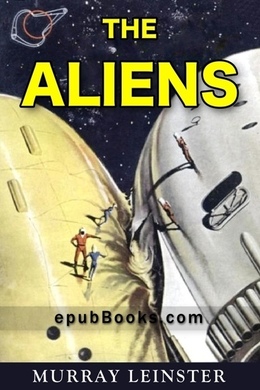
-
EPUB 264 KB
-
Kindle 296 KB
-
Support epubBooks by making a small $2.99 PayPal donation purchase.
This work is available in the U.S. and for countries where copyright is Life+70 or less.
Description
What will happen when we first encounter sentient beings from outer space? In this action-packed account of first contact between the human denizens of Earth and an alien species, Murray Leinster details the tense early interactions between clashing spaceships. Is long-term coexistence possible? Read The Aliens to find out.
54 pages with a reading time of ~60 minutes (13701 words), and first published in 1959. This DRM-Free edition published by epubBooks, 2015.
Community Reviews
-
a nice book
May 31
Excerpt
At 04 hours 10 minutes, ship time, the Niccola was well inside the Theta Gisol solar system. She had previously secured excellent evidence that this was not the home of the Plumie civilization. There was no tuned radiation. There was no evidence of interplanetary travel–rockets would be more than obvious, and a magnetronic drive had a highly characteristic radiation-pattern–so the real purpose of the Niccola’s voyage would not be accomplished here. She wouldn’t find out where Plumies came from. There might, though, be one or more of those singular, conical, hollow-topped cairns sheltering silicon-bronze plates, which constituted the evidence that Plumies existed. The Niccola went sunward toward the inner planets to see. Such cairns had been found on conspicuous landmarks on oxygen-type planets over a range of some twelve hundred light-years. By the vegetation about them, some were a century old. On the same evidence, others had been erected only months or weeks or even days before a human Space Survey ship arrived to discover them. And the situation was unpromising. It wasn’t likely that the galaxy was big enough to hold two races of rational beings capable of space travel. Back on ancient Earth, a planet had been too small to hold two races with tools and fire. Historically, that problem was settled when Homo sapiens exterminated Homo neanderthalis. It appeared that the same situation had arisen in space. There were humans, and there were Plumies. Both had interstellar ships. To humans, the fact was alarming. The need for knowledge, and the danger that Plumies might know more first, and thereby be able to exterminate humanity, was appalling. Therefore the Niccola. She drove on sunward. She had left one frozen outer planet far behind. She had crossed the orbits of three others. The last of these was a gas giant with innumerable moonlets revolving about it. It was now some thirty millions of miles back and twenty to one side. The sun, ahead, flared and flamed in emptiness against that expanse of tinted stars. Jon Baird worked steadily in the Niccola’s radar room. He was one of those who hoped that the Plumies would not prove to be the natural enemies of mankind. Now, it looked like this ship wouldn’t find out in this solar system. There were plenty of other ships on the hunt. From here on, it looked like routine to the next unvisited family of planets. But meanwhile he worked. Opposite him, Diane Holt worked as steadily, her dark head bent intently over a radar graph in formation. The immediate job was the completion of a map of the meteor swarms following cometary orbits about this sun. They interlaced emptiness with hazards to navigation, and nobody would try to drive through a solar system without such a map. Elsewhere in the ship, everything was normal. The engine room was a place of stillness and peace, save for the almost inaudible hum of the drive, running at half a million Gauss flux-density. The skipper did whatever skippers do when they are invisible to their subordinates. The weapons officer, Taine, thought appropriate thoughts. In the navigation room the second officer conscientiously glanced at each separate instrument at least once in each five minutes, and then carefully surveyed all the screens showing space outside the ship. The stewards disposed of the debris of the last meal, and began to get ready for the next. In the crew’s quarters, those off duty read or worked at scrimshaw, or simply and contentedly loafed. Diane handed over the transparent radar graph, to be fitted into the three-dimensional map in the making. “There’s a lump of stuff here,” she said interestedly. “It could be the comet that once followed this orbit, now so old it’s lost all its gases and isn’t a comet any longer.” * * * * * At this instant, which was 04 hours 25 minutes ship time, the alarm-bell rang. It clanged stridently over Baird’s head, repeater-gongs sounded all through the ship, and there was a scurrying and a closing of doors. The alarm gong could mean only one thing. It made one’s breath come faster or one’s hair stand on end, according to temperament. The skipper’s face appeared on the direct-line screen from the navigation room. “Plumies?” he demanded harshly. “Mr. Baird! Plumies?” Baird’s hands were already flipping switches and plugging the radar room apparatus into a new setup. “There’s a contact, sir,” he said curtly. “No. There was a contact. It’s broken now. Something detected us. We picked up a radar pulse. One.”
